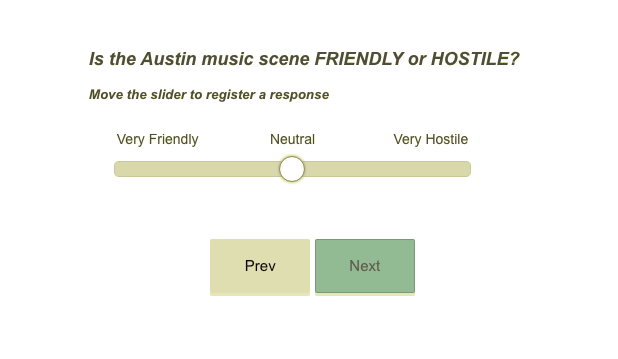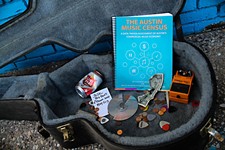For the First Time Since 2015, a New Austin Music Census Is Now Open
Survey seeks measurable industry feedback to guide policy and support
By Rachel Rascoe, 8:30AM, Fri. Jul. 15, 2022

The first-ever Austin Music Census, circa 2015, is still referenced to this day everywhere from Music Commission meetings to fundraising speeches by music nonprofits to proposals for construction of new venues.
The study highlighted that musicians were struggling, with 75% falling below Austin's average annual wage. Following a pandemic and skyrocketing Austin housing prices, it’s safe to say local musicians now face even greater challenges – but advocates could use some updated info to support the argument. Today, partners including Mayor Steve Adler and KUTX launch a new “2022 Greater Austin Area Music Census.”
The census, which takes 15 to 20 minutes to fill out, is open now at www.austinmusiccensus.org. The census will be open until August 15 to music industry workers living or working in the Greater Austin area, including Travis, Williamson, Hays, Caldwell, and Bastrop counties. The effort seeks responses, and write-in comments, to potentially influence civic policy and route support to Austin industry.
The group seeks responses from musicians, venue owners, music nonprofits, music business professionals, and beyond. Completely anonymous, the survey doesn’t request names or personal details of respondents. Results will be released publicly, in a series of infographics and a report, later this year. Compared to the 2015 focus on industry dollar amounts, the new census doesn’t request any numbers on earnings.
The census lists support from over 50 Austin entities including nonprofits the SIMS Foundation, HAAM, EQ Austin, Austin Creative Alliance, and Red River Cultural District. Other partners include BMI, C3 Presents, Texas Music Office, the Recording Academy Texas Chapter, and the city's Economic Development Department.
Theresa Alvarez, CEO of the long-sought Austin Economic Development Corporation, said via press release: “We will hopefully be one of many that will utilize this critical data to help support organizations, programs, and policy-makers create a more effective support system to retain and grow the sector, while remaining the Live Music Capital of the World.”
Questions run the gamut of healthcare, housing, and use of music-related resources like grants, training, and local organizations. Organizers said the new survey has an expanded focus on social and cultural aspects of Austin music. In a section on Diversity, Equity and Inclusion, respondents move a slider between two sets of adjectives asking whether the Austin music scene is “friendly or hostile,” “racist or inclusive,” “sexist or non-sexist,” and more.
Alejandro “Alex” Vallejo, of census partners the Austin Music Foundation and Latin Music Coalition Austin, said via press release: “The [data] will help Austin local music organizations navigate better and more fair ways to support and serve our local music community that benefits all musicians of color.”
To get your gears turning, open-ended write-in inquiries on the survey include:
In your own words, what are the skills and activities you provide professionally in music?
What role have Austin area nonprofits played in supporting your music career?
Do you think there is a common goal that can be shared amongst all Austin music people for the future of our music ecosystem? If so, what is it?
Whereas the 2015 survey was commissioned by the City of Austin and conducted by Titan Music Group, this edition will be overseen by Austin-based company Sound Music Cities. Former Austin Music & Entertainment Division Manager Don Pitts launched Sound Music Cities after running the city music office since its inception in 2010, where he conceived the Austin Music Census idea. His research group has also worked on similar census projects in Charlotte, Dallas, D.C., and Seattle.
A note to readers: Bold and uncensored, The Austin Chronicle has been Austin’s independent news source for over 40 years, expressing the community’s political and environmental concerns and supporting its active cultural scene. Now more than ever, we need your support to continue supplying Austin with independent, free press. If real news is important to you, please consider making a donation of $5, $10 or whatever you can afford, to help keep our journalism on stands.
Kevin Curtin, Feb. 1, 2016
June 21, 2024
June 14, 2024
Austin Music Census, Don Pitts, 2022 Greater Austin Area Music Census, KUTX, Mayor Steve Adler, Theresa Alvarez, Alex Vallejo









